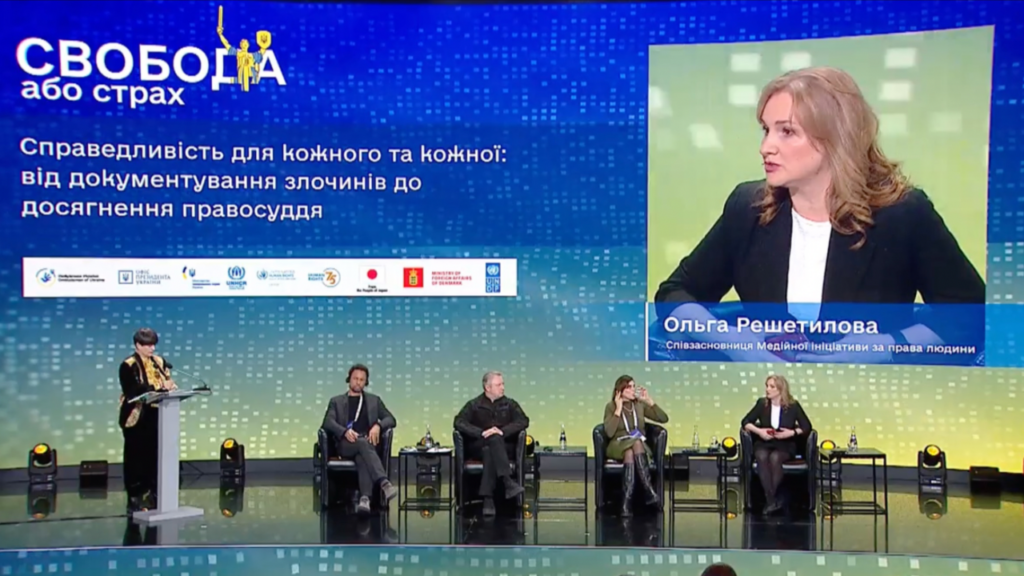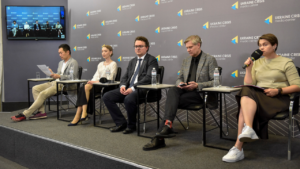“We need to change consumerism’s approach to war victims and their tragedies,” Olha Reshetylova

The Head of the MIHR, Olha Reshetylova, participated in the international human rights conference “Freedom or Fear.” She delivered a speech during the panel discussion “Justice for everyone: from documenting crimes to achieving justice”:
— There is no discussion in Ukrainian society about what justice means to us. On the one hand, we have frustrating figures on the number of crimes from the Prosecutor General’s Office, and anyone who is even slightly involved in justice understands that it will take decades to investigate this entire volume of crimes. On the other hand, we have the experience of the previous ten years because the war for us began with the annexation of Crimea and perhaps with the events of Maidan, where Russian special services were involved. During these ten years, we have seen how difficult the investigation process was. How difficult it was for the international community to realize that Ukraine was an international armed conflict, not a civil war. Remember how many discussions were held about whether Russia was exercising effective control in Donbas or not.
It seems that justice often fails to keep up with the demand for justice. It is complicated. It is sometimes dependent on politics. At the same time, the idea of justice should not be infantile either.
In pursuit of justice, we must take responsibility. For the Ukrainian side, this responsibility lies at least in the decision to ratify the Rome Statute of the ICC. We have high expectations of the international justice system, but at the same time, we cannot find the political will to strengthen the national system. This is about our responsibility, first and foremost, to the victims, for whom it is essential to show what justice can be today.
In our interviews with victims, of which we conduct dozens, we ask: “What does justice mean to you?” And we rarely hear that it is reparations or some material benefits. More often, victims say that justice for them means a victory for Ukraine, bringing the highest military and political leadership of Russia to justice. They also need attention to their tragedy. This is what journalists do to a large extent. But there is a nuance. Covering or documenting the story or listening to the victim is insufficient. It is essential to go with them through the difficult path to justice. Now, when we see the number of recorded crimes that the prosecutor’s office calls out turn into trials, we don’t know the public and the media in the courts. This was the case with the Maidan cases. Because the high-profile stage of the proceedings passes and the public’s attention wanes.

Olha Reshetylova, Head of the MIHR, at the international human rights conference “Freedom or Fear”
I had a very heated discussion with Ukrainian journalists when the interrogation of the victims in the court case regarding the crime in Yahidne began. We did not see a single media representative when we arrived at the court. I posted about this on Facebook, which sparked a heated debate. The journalists wrote that they had already talked about Yahidne so much. How much more can we do? This, in my opinion, is a very cynical approach to victims, saying that we have already worked you out, we have gone to talk about other crimes, and we wont continue to go with you on this path to justice. We need to change this consumerist approach to tragedies.
I constantly appeal to the media, the public, and civil society organizations to go to the courts and monitor how justice is administered. To criticize because there is something to criticize, to praise when they deserve it, to understand the complex nuances of bringing to justice. It is difficult, but it is about growing up. And about being ready to participate in the justice process because we care.
But among other things, it is about our right to the truth.I often say that the history of Ukraine is written in the courts. It is in the courts that the truth should be established. And we need to control whether the history will be as we see it and as we understand it.
We often see radical approaches in court proceedings and public requests to law enforcement agencies. Whenever we write about a trial in a case of collaboration or high treason, we receive dozens of radical and categorical comments about the accused. No one wants to get to the bottom of the case; it’s enough for people to hear that someone has pointed a finger at the accused. This is not right. We must remember the presumption of innocence because we all must continue living in this society. We will need to somehow find a common language with each other.
We are now at the forefront of justice and justice around the world. Realizing this, we, together with our partners, held the “Crimea Global” conference in October, inviting representatives from South and Central America, Africa, and Asia. We invited them to talk about themselves because Ukrainian society has been focused on itself for many years, again infantilely. And it turns out that many countries have already partially gone the way we are now. And many of our problems resonate with them. So, during this conference, we learned from an oppositionist from Nicaragua that their Special Services use the same types of torture that Russians use against Ukrainian civilian hostages and prisoners of war. It turns out that Russian Federal Security Service officers are training Nicaraguan intelligence services in torture. Also, officials and intelligence officers in Nicaragua are required to know Russian. In other words, Russia is exporting the methods of persecution that it has been honing in the occupied territories of Ukraine, creating a network of dictatorships. And if we do not stop them here, the war will become much closer to both the United States and France, where the Wagner Group is historically active in the Sahelian region of Africa. Therefore, it is crucial to stop this process and punish the perpetrators for the sake of justice, which we must pass on to future generations around the world.






